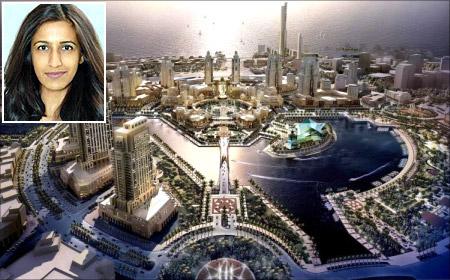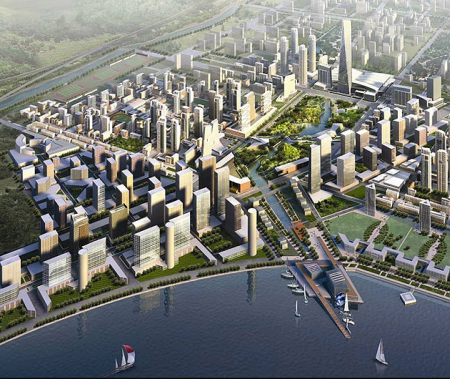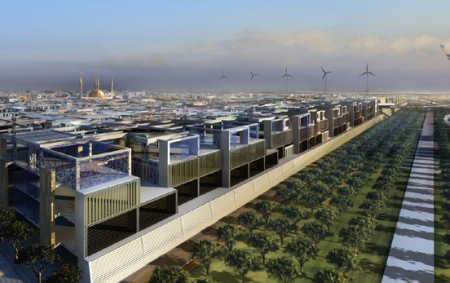Photographs: Reuters Ayesha Khanna
The 21st century has been referred to as "the urban century". By 2050, over 70 per cent of the world's population will live in cities.
The rate of urbanization is staggering: more than 400 million people in China and 215 million people in India will migrate from villages to cities by 2015. Today's cities can barely handle the burden of their current populations: core services like energy, water, communications, transportation, and public safety are inefficient and increasingly decrepit.
The burden on the environment is also profound: cities only occupy two per cent of the landmass of the Earth, for example, but account for over 75 per cent of our total resource consumption. The influx of millions of rural hopefuls chasing the urban middle-class dream will stretch the capacity of Indian cities like Delhi and Mumbai to breaking point.
Management professor C K Prahalad famously said in 2009: "India needs to build a minimum of 500 new cities urgently. However, it has to be done from scratch to accommodate people who are on the move and to provide them better quality life." Whether India builds new cities, or extends and develops existing ones, it needs a new city governance model that is 'faster, better, cheaper'.
...
India needs to rethink notion of 'smart cities'
Image: A view of Songdo, a smart city in South Korea.Photographs: mpfp.com
Many believe "smart" cities are the answer. "Smart" cities herald a new age where information technology, not roads, buildings, or bridges, will form the core infrastructure of cities.
This digital infrastructure will use a network of sensors, cameras, wireless devices, data centres and powerful analytics to enable the government to provide more efficient services, maintain a low carbon footprint, and create an entrepreneurial environment for its citizens.
Given the potential for such intelligent governance, cities with digital infrastructures are called "smart" cities. Today, there are over 125 smart city projects of varying sizes all over world, including new cities like Songdo in South Korea and Masdar in the UAE, and existing cities like Stockholm and Rio.
It is estimated that over $40 trillion will be spent by 2030 on city infrastructure projects with over $1 trillion invested just in smart technologies over the coming decade. India too has declared that it will build seven new smart cities in the Delhi-Mumbai Industrial Corridor.
Meanwhile, the private sector has already started building one new medium sized city (with an average population of half a million people) called Lavasa nestled in the hills between Mumbai and Pune.
...
India needs to rethink notion of 'smart cities'
Image: Masdar, a smart city in the UAE.Photographs: forcedgreen.com
After being stalled by environmental protests for one year, construction in Lavasa has recently been given the clearance to restart and the city aspires to both use sustainable design and information technologies to create a model city for India's burgeoning urban population.
Throwing technology at cities will not abate its problems, especially in India. The majority of new cities built to accommodate the new middle class will not be private developments catering primarily to the rich.
They will require heavy participation from the government, and corruption, bureaucracy, and budgetary constraints make it difficult to execute information infrastructure and integration projects, the hallmark of smart cities.
In fact, viewing a city just through a technological lens is problematic in itself: cities reflect the values and cultures of the communities that live in them, not the technologies they use.
The original assertion that city governance needs to "faster, better and cheaper", is therefore utterly flawed: first and foremost, city governance needs to have local representation and citizen participation, which is further enabled by efficient and cheap information infrastructure.
If the values that governments seek are equity, sustainability, and productivity, to name a few, then the city must strategically build the technological infrastructure that will generate those goals.
...
India needs to rethink notion of 'smart cities'
Image: A view of Lavasa, a private, planned city between Mumbai and Pune.Photographs: ravikarandeekarsblog.blogspot.com
In existing cities like Mumbai, where people are overflowing and 60 per cent of the population lives in slums, the answer will lie in using "people as infrastructure".
Using the mobile phones that almost every person in the city carries must be utilized in governing the city. For example, using network analysis, the geolocation function of the phones will enable the transport authority to inform residents of the public transport schedules and to divert traffic as certain areas become more congested than others during the course of the day.
Bangalore based non-profit Mapunity, founded by Ashwin Mahesh, leverages "just-good-enough" cheap information infrastructures generated through a variety of sources to enable citizen participation and government transparency.
Mapunity's BTIS (Bangalore Traffic Information System) used mobile phone usage and taxi radio systems to create a GIS infrastructure that reports traffic real-time to citizens via text messages.
Responsive systems based on the strategic combination of smart infrastructure and mobile phones should meet three conditions: (i) the privacy of citizen data used must be respected by law; (ii) the government must reach a deal with the telecommunication companies about the terms of using the data gleaned from mobile services; (iii) data from sensors, cameras and government agencies, and from mobile phones, should be made transparent and public so that citizens may innovate new products and services themselves.
...
India needs to rethink notion of 'smart cities'
Image: Sixty per cent of people live in slums in Mumbai. A view of Taj Mahal hotel.Photographs: Reuters
For new satellite and medium-sized cities, it is easier to design the smart infrastructure in a comprehensive way so that all the government agencies use electronic records that are integrated and governance is transparent.
Investments such as data centres, analytics engines, and wireless devices for managing the city can be made as part of the initial capital investment.
However, care must be taken to use frugal innovation as far as possible even in the creation of new smart cities. A combination of cheap sensors and mesh networks may be far more feasible, and therefore faster to implement, for example, than laying down expensive fiber optics.
If India is going to build new cities for its urban middle class, and by many estimates, it needs to build several hundred of them, then it needs to rethink the popular notion of smart cities as networked cities with top-down expensive technology infrastructure.
Instead, India's smart cities will consist of a patchwork of technology modules that use people as infrastructure, and employ analytics to create the information flows that empower citizens and improve city life.
Ayesha Khanna is Founder and Director of the Hybrid Reality Institute, a research and advisory group focused on human-technology co-evolution and geotechnology. She is the author of Straight Through Processing and her forthcoming books include Hybrid Reality (with Parag Khanna) and The Generative City.
She can be contacted at http://ayeshakhanna.com






article